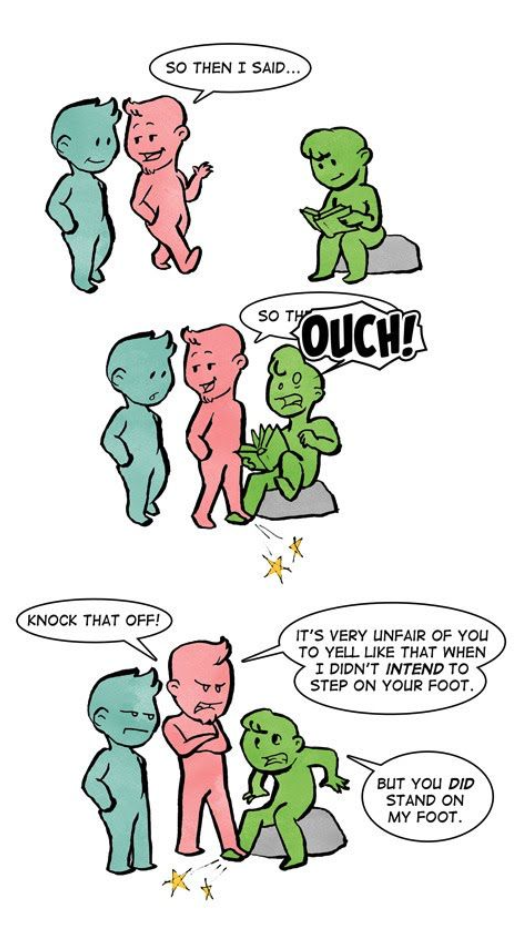“That’s not what I meant!”
How many times have you said those words in your lifetime? We begin every conversation with a particular intent, or what we mean to say. But intent doesn’t guarantee that your message will be received the way you expected. The impact–what the other person hears, feels, and understands–can often differ greatly from your original intention.
In short, intent is what you mean to do, whereas impact is how others perceive what you do.
The road to hell is paved with good intentions.

Intent and impact can dictate not only working relationships, but the entire workplace dynamic as well. When the two align, people feel heard and understood, which boosts productivity and morale. But when intent and impact differ, people can feel hurt or angry–which often results in conflict and miscommunication. Consider these examples:
- You tell your colleague a joke that upsets them. Your intent was to be lighthearted and funny, but the impact was hurtful.
- Your supervisor institutes a new policy whose aim is to improve your team culture, but the team sees it as more work and surveillance. The intent was to boost morale and collaboration, but the impact was demotivating.

Despite your best intentions, your words and actions won’t always have your desired impact. Family, friends, and colleagues can’t read your mind–instead, they filter your words through their own experience.
With that in mind, let’s consider some strategies for using intent and impact to improve communication at work.
Don’t Take Impact Personally
Intent is personal, and tied to who you inherently are at your core. If you’re a helpful person, your intent is likely to help people. If you’re goal-oriented, your intent is likely to move people toward accomplishing goals.
While impact is rarely personal, it can certainly feel that way–and when the impact is hurtful, you may well feel inclined to defend yourself so the other person understands that wasn’t your intent. But being defensive can exacerbate the situation.
Imagine you’re at your desk and decide to roll your chair over to the printer to grab a paper. In the process, you roll over your co-worker’s foot. When they cry out in pain and ask, “What did you do that for?”, you instinct may be to defensively shout back, “I didn’t mean to!”
Instead, focus on the recipient instead of yourself. “I’m so sorry! Are you ok?” The fact is that your actions hurt them, whether you meant to or not. It doesn’t mean you’re a hurtful person.
When someone says your impact was hurtful, they’re referring to their own experience and perception of your actions. By respecting their experience, you can respond in a way that fosters communication and connection, rather than alienation and resentment.
Be Conscious About Diversity
Communication is never easy, and a conversation can quickly go south in many different ways. Our words, non-verbal cues, timing, and tone (among other variables) can easily veer things off course.
Our individual differences–namely gender, background, and culture–also factor in. Different people absorb, perceive, and respond to the same information in different ways, so the impact of your words or actions will vary depending on whom you’re talking to.
Communication is an art, not a science. With such a broad array of people in our lives that we interact with on a regular basis, we can never know exactly what to say and how to say it to ensure the impact of our words matches our intent. We will make mistakes, but we can learn from them, and educate and better ourselves in the process.








